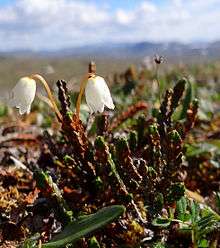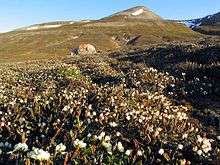Cassiope tetragona
Cassiope tetragona (common names include Arctic bell-heather, white Arctic mountain heather and Arctic white heather) is a plant native to the high Arctic and northern Norway, where it is found widely.
| Cassiope tetragona | |
|---|---|
 | |
| Scientific classification | |
| Kingdom: | Plantae |
| Clade: | Tracheophytes |
| Clade: | Angiosperms |
| Clade: | Eudicots |
| Clade: | Asterids |
| Order: | Ericales |
| Family: | Ericaceae |
| Genus: | Cassiope |
| Species: | C. tetragona |
| Binomial name | |
| Cassiope tetragona | |
Growing to 10–20 cm in height, it is a strongly branched dwarf shrub. The leaves are grooved, evergreen, and scale-like in four rows. Pedicels are long and arched. The plant bears bell-shaped, solitary flowers usually with white and pink lobes and pink anthers. The flower stalks and sepals are red, but the petals may also be yellowish-white. The anthers can also be brownish-yellow and flower stalks and sepals yellowish-green.

It grows on ridges and heaths, often in abundance and forming a distinctive and attractive plant community.
In Greenland, indigenous peoples use the plant as important source of fuel. Because of high resin content, it burns even when wet.[1]
The plant can also be used in cooking. Canadian chef Louis Charest used arctic heather as a smoked herb for the 2016 Three Amigos Summit state dinner.[2]
See also
References
- John 'Lofty' Wiseman SAS Survival Handbook, Revised Edition p. 72; William Morrow Paperbacks (2008) ISBN 978-1875900060
- "Rideau Hall chef cooking up a coast-to-coast dinner for Three Amigos summit". Retrieved 2016-06-28.
| Wikimedia Commons has media related to Cassiope tetragona. |
| Wikispecies has information related to Cassiope tetragona |